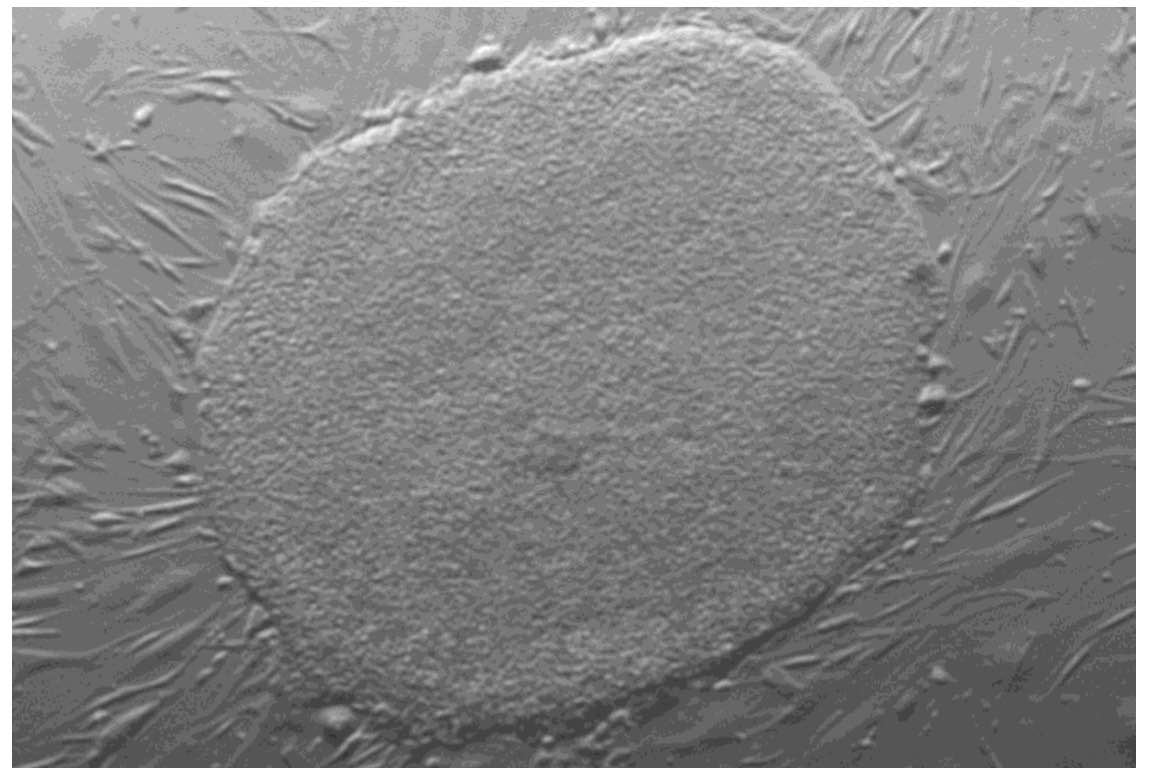Early during my postdoc I was primarily interested in the role of Myc genes both in cancer and in stem cells, work that later included embryonic stem cells. These cells are often called ES cells.
At first I first started studying N-Myc in neural stem cells using a conditional knockout approach. However, soon after I was excited about figuring out what Myc and N-Myc might be doing in ES cells too. This was just before Yamanaka reported his four-factor reprogramming including Myc.
The next few years were an exciting time.

Myc gene in embryonic stem cells
Eventually, we made mouse ES cells that were floxed for both Myc and N-Myc. Addition of an enzyme called Cre could lead to a double knockout of both of these key Myc genes. Our studies led to a better understanding of the role of the Myc family in pluripotency. Myc proteins have key roles in pluripotency and self-renewal. These mechanisms relate to its cancer-causing ability when overexpressed.
This was back in the mid-to-late-2000s. Many people thought that human ES cells would lead relatively quickly to therapies. However, it seemed like a long road ahead.
Now we as a field have reached a quarter century since human ES cells were first reported by Jamie Thomson. Where does the field stand clinically in terms of translation of ES cells to the clinic?
That brings us to our first item.
After 25 years of hype, embryonic stem cells are still waiting for their moment, MIT Tech Review. This is a tough headline for a piece from Antonio Regalado. The article is well-balanced though. There are many potential therapies slowly moving forward. One potential therapy in development highlighted in Antonio’s piece is from Neurona for epilepsy.
A take-home message from the article is just how hard it is to get an approved, safe, and effective cell therapy.
I was surprised that Antonio didn’t specifically discuss iPS cells more.
More recommended reads
Aspen Neuroscience Announces FDA Clearance of Investigational New Drug Application for ANPD001, Autologous Cell Therapy for the Treatment of Parkinson’s Disease, PR. It’s exciting to see an IND for Parkinson’s Disease. Stem cell biologist Jeanne Loring founded Aspen.
Designing persuasive health education for patients seeking unproven stem cell interventions, Stem Cell Reports. Really interesting piece from a team led by Zubin Master. It’s a tough battle out there to educate patients and help them make good decisions in the stem cell clinic space. I get several emails a week from patients with questions about clinics.
Rescue of Alzheimer’s disease phenotype in a mouse model by transplantation of wild-type hematopoietic stem and progenitor cells, Cell Reports. This is interesting work from Stephanie Cherqui and her team.
I’ve been somewhat skeptical over the years of the idea of using blood cells to treat neurodegenerative disorders. Part of my skepticism may have arisen from so many stem cell clinics selling bone marrow cells or even MSCs to supposedly treat dozens of neurological conditions.
This mouse study has some cool data. It proposes that HSCs may use a unique potential mechanism involving microglia. At this point no one should be selling marrow cells for Alzheimer’s treatment. The field needs much more data to consider such therapies.
The promise of banking umbilical cord blood, BBC. This headline had me worried at first. Was this going to be another shallow piece promoting the benefits of specific private cord blood banks?
Fortunately, the answer is no.
The piece digs into this topic in some depth and, for example, explores public vs. private cord blood banking. I support the former wholeheartedly. However, private cord blood banking is more complicated. While there can be benefits of private banks, they are just rare and most families are wasting thousands of dollars as they’ll never need the cord blood units. Still, for some families, it may be worth it.
I wish the BBC had a better title for their piece. Something more nuanced.
Check out: Fact-checking, pros and cons of cord blood banking. I’ve also included my video fact-check on cord blood cells for autism above. If you like our YouTube channel please subscribe.
- SEO Powered Content & PR Distribution. Get Amplified Today.
- PlatoData.Network Vertical Generative Ai. Empower Yourself. Access Here.
- PlatoAiStream. Web3 Intelligence. Knowledge Amplified. Access Here.
- PlatoESG. Automotive / EVs, Carbon, CleanTech, Energy, Environment, Solar, Waste Management. Access Here.
- PlatoHealth. Biotech and Clinical Trials Intelligence. Access Here.
- ChartPrime. Elevate your Trading Game with ChartPrime. Access Here.
- BlockOffsets. Modernizing Environmental Offset Ownership. Access Here.
- Source: https://ipscell.com/2023/08/weekly-reads-embryonic-stem-cells-parkinsons-alzheimers/



